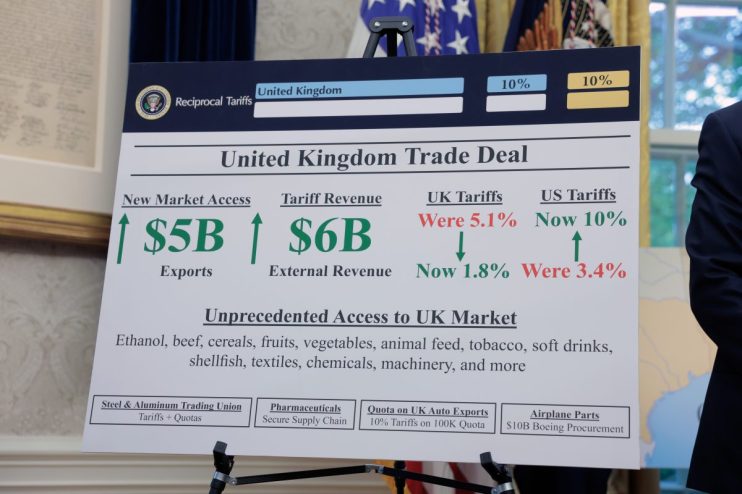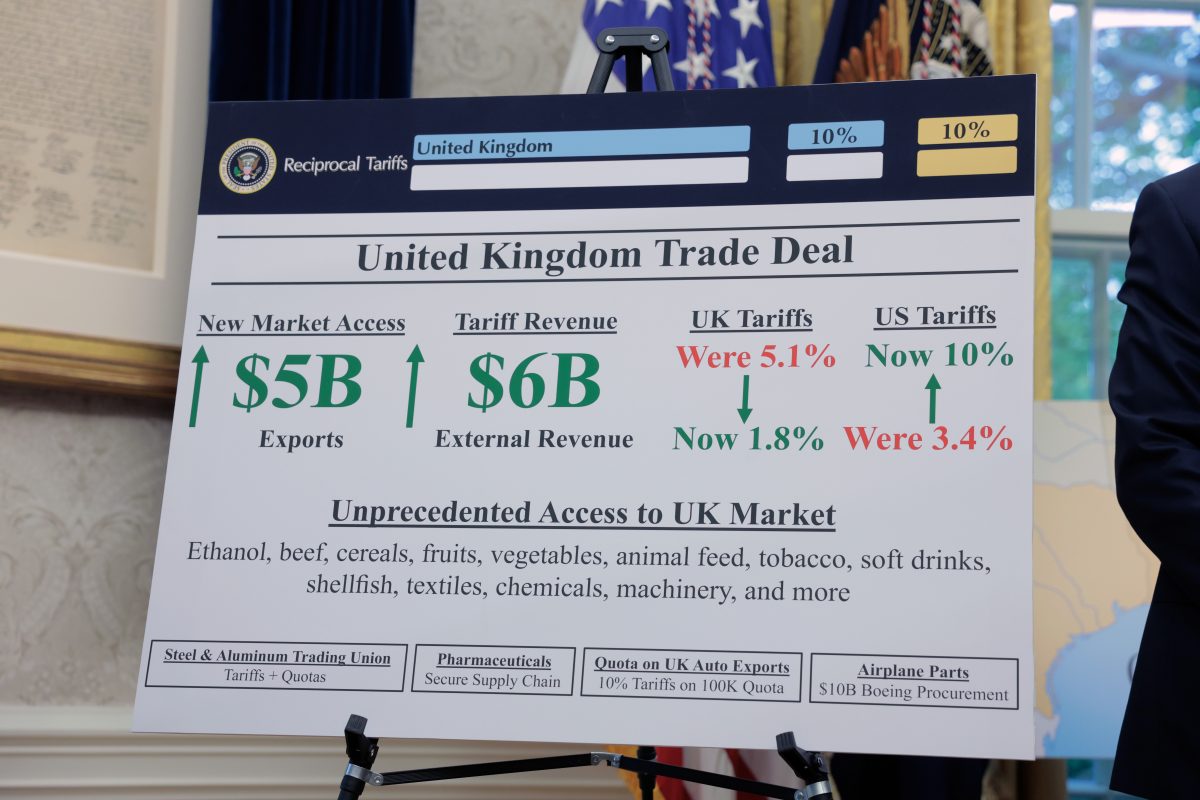Saturday 19 July 2025 5:33 am
| Updated:
Wednesday 16 July 2025 10:37 am
By:
Jenna Glass and Stuart Burt
Share
 WASHINGTON, DC – MAY 08: A poster board is seen as U.S. President Donald Trump talks with reporters in the Oval Office at the White House on May 08, 2025 in Washington, DC. During his remarks Trump spoke about a trade deal with the United Kingdom that he announced today on Truth Social. (Photo by Anna Moneymaker/Getty Images)
WASHINGTON, DC – MAY 08: A poster board is seen as U.S. President Donald Trump talks with reporters in the Oval Office at the White House on May 08, 2025 in Washington, DC. During his remarks Trump spoke about a trade deal with the United Kingdom that he announced today on Truth Social. (Photo by Anna Moneymaker/Getty Images)
The Insight in 15 is a new podcast from professional services firm KPMG offering a fresh perspective on major issues for business leaders.
The 10-part series will cover a range of topics by cutting to the chase, setting out the risks and opportunities, and providing insights those at the top of big businesses can put into action straight away. All in just 15 minutes.
The first episode is now live on Spotify, Apple Podcasts and YouTube and here is a taster showcasing host Stuart Burt, Deputy Head of External Affairs at KPMG, asking questions on all things US trade tariffs to Jenna Glass, Director of Trade, Customs and Export at the firm.
Can you just explain where we’re at right now?
“So definitely a lot going on right now since the start of the new US administration. And interestingly, in the last 150 or so days, there has been a tariff announcement every three to five days. So a lot to kind of wrap your head around and try and parse out what’s real and what’s not. But where we are today is the 9 July deadline came and went. We started to see a couple of trade deals come together in preparation for that. But despite the administration’s 90 deals and 90 day target, we only saw three in that time frame. That being with China, with the UK importantly, and then Vietnam. But the administration issued over 20 letters recently threatening new levels of tariffs if deals aren’t made by the extension of the 1 August deadline.”
So what happens then between now and the 1 August?
I think between now and 1 August there will be continued volatility, a lot of discussions similar to what we’ve been seeing since April or really since the start of the administration of what will come together. So hopefully between now and 1 August, we’ll see some additional deals.
Do you think the 1 August is a hard deadline?
I would think not, in part, based on what we’ve seen to date, that, you know, it has been a little bit of a moving target. And also, depending on how close countries are to reaching a deal, maybe we’ll see another extension.
I just wanted to touch on the UK trade agreement that was struck. Can you just explain what is actually covered in that?
So right now, we are really just seeing relief as it pertains to automobiles and automobile parts, which the first 100,000 cars imported into the US will be imported at a 10 per cent tariff. Every car thereafter will be at 27.5 per cent. So quite a significant hike. On the other side, the aerospace industry saw some relief with the steel. They went from 10 per cent tariffs to 0 per cent tariffs into the US, and there’s no quota currently on the aerospace industry. One additional benefit for the UK is 25 per cent on steel and aluminium and their derivative products while the rest of the world is being faced with 50 per cent.
Read more
UK trade deals to lift growth, KPMG says
Are we going to see a continued decrease on what those tariffs for the UK might be potentially as the conversations are still ongoing with the UK?
So there is some positive impact for some businesses in some sectors, but if you take a look at the landscape more generally, 10 per cent tariffs on goods going into the US from the UK is still there, doesn’t seem like that’s going to change. And so if not that, where else might we negotiate further?
Businesses have had a few months to adjust, do you think the mood music is a bit more positive amongst UK businesses than some are saying?
I wouldn’t go that far. You know, this still, these developments in recent months have completely shaken up the way that we look at global trade. We went from an era of free or preferential trade where we were lowering trading barriers throughout the world to now pretty significant tariff barriers. So how companies strategically organise themselves throughout the globe, are they going to offshore as much? Are they going to bring in more operations for near-shoring? Bring it onshore to do the work? All remains to be seen.
Because we’ve already gone through a similar process with Brexit a couple of years ago, we in the UK are already well-drilled in how to respond to a big event or moment of development like tariffs. How much do you think there is in that argument?
What I am hearing is that companies experience in navigating Brexit has definitely given them a leg up in understanding how to navigate this kind of disruption, what sort of information they need access to, to understand the impact, and then look to whatever mitigating actions that they can find.
So businesses are getting prepared right now and they’re already on that journey. What does that mean in practical terms?
First, stay informed. I know it can seem like a lot and maybe make you feel a little bit crazy to follow the headlines, but it’s really important. Two is get access to your data and map out your supply chain. Three, there is an opportunity to renegotiate some of your supplier contracts. Fourth is really going back to your core compliance concepts of country of origin because with the reciprocal tariffs, origin is key.
My final question, if you had one thing to advise businesses today on how to respond to tariffs, what would it be?
Get access to your data. It sounds simple, but we’ve found with companies and especially really large organisations, it can be difficult to know what data you have, how clean it is, and if you can trust the data. But once you get access to your data, you can map out your supply chain. You can understand the financial impact. And that way, no matter what new development is announced, you are able to go back to your data and quickly understand the impact to you.

Read more
Trump tariffs: UK to dodge 50 per cent steel and aluminium levies
Similarly tagged content:
Sections
Categories
People & Organisations
